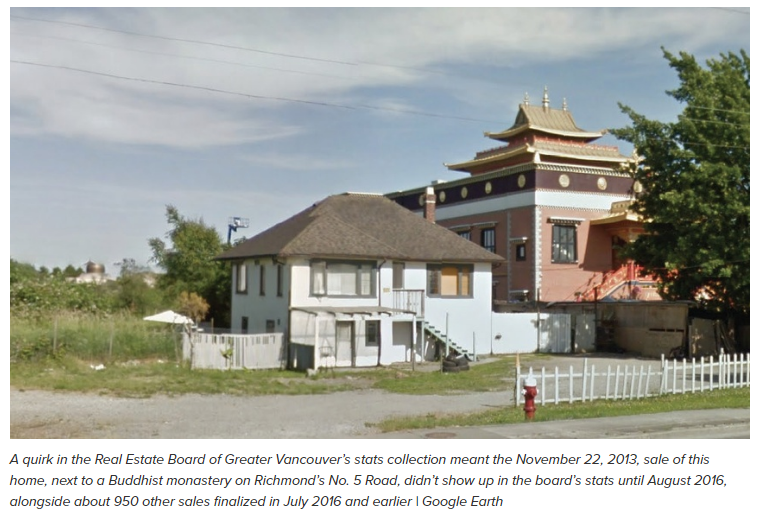
But the problem is this: more than 38% of the REBGV’s supposed August sales and their prices were actually agreed by buyers and sellers in previous months. A realtor who wanted to remain anonymous sent the Hongcouver blog the full list of 948 such sales, saying it was “misleading” to include in the August stats so many that were actually struck earlier.
In at least one case, much earlier: one of the REBGV’s August 2016 sales – a house on Richmond’s No 5 Road that went for C$1.875 million – was agreed on November 22, 2013.
That was an outlier. But huge numbers of supposed August 2016 sales were signed in June and July.
The anomaly is inherent in the REBGV’s stats, because they don’t actually represent when a sale is signed and a price agreed: they reflect when it became unconditional and was then submitted to the REBGV for processing (supposedly within five days).
Normally the use of processed sales instead of actual sales isn’t such a big deal: it generally means the stats lag the market by a few weeks.
But it is potentially a big deal for anyone trying to understand the immediate impact of a Big Bang event that occurred on a specific date – like the foreign buyers’ tax – and particularly if the market took a directional change during the preceding 12 months upon which the year-on-year figures are based.
However, there are some valid reasons for the REBGV’s approach. Primarily it helps achieve consistency in the ongoing stats, but also it allows the board to deliver numbers in a relatively timely fashion.
The board said it was “critically important to maintain the same reporting criteria in order to keep historical comparisons valid and accurate.”
“The lag between when a contract is signed and when the sale becomes unconditional is dependent on the time it takes for subjects to be removed,” it said. “The more complicated the transaction, the longer it can sometimes take for the participating parties to remove subjects.” Such circumstances could include subject-to-sale, land assembly or commercial deals.
Regardless of the reasons, a huge chunk of the supposed August sales were struck earlier. Of those 948 sales, three took place in February 2016, one in March, three in April and six in May. Sixty-one took place in June, leaving 873 sales that occurred in July 2016. Of these, 424 took place from July 1-24, and a further 449 took place from July 25-31, after the announcement of the tax but before imposition.
Realtor and market analyst Steve Saretsky has previously reported on the distinction between actual sales and processed sales.
He said about 25% of processed sales cited in the REBGV’s monthly stats typically occur in previous months (a breakdown provided to the Hongcouver blog by its source suggested that number actually ranged from 29 to 42% over the past 12 months). And, naturally, the processed sales numbers are sometimes lower than actual sales, particularly in a rising market.
“I believe the processed sales data is somewhat inaccurate because it doesn’t show real-time numbers,” Saretsky said. “Sometimes sales can happen as far back as a couple months and then be counted as a current sale. Meaning, if the buyer and seller agreed on a sales price [and] enter it as a firm deal on, say July 20, pre-15% tax, there’s a good chance it counts as an August sale because it takes time to process it. This will obviously skew the numbers.”
Both the source and Saretsky say the impact of the foreign buyers’ tax – both in the decline of sales and prices – has been understated because of the phenomenon.
According to the board’s stats package, its Home Price Index benchmark price of $933,100 for all residential properties in August was up 4.9% over the past three months, and up 31.4% compared to August 2015. It represented a modest 0.3% increase compared to July 2016.
But that is contrary to the experience of the source of the not-in-August data, who has observed prices of detached homes dropping by up to 10% in some markets.
And Saretsky, who said the board should consider delaying the release of its monthly stats a few weeks instead of rushing them out, said buyers and sellers hoping to understand the impact of the new tax need to look beyond the board’s August numbers. “If you want real-time data, then processed sales are not the way to go,” he said.
“As for my observation with the 15% tax, I think it’s done what it was intended to do, which is curb demand.”
This seems particularly true for the detached market. The board’s 715 processed sales already represent a 44.6% drop in detached sales, year on year. But Saretsky said that in fact, only 631 sales were struck last month. On that basis, the detached sales slump, year over year, has hit more than 50%.
References: www.biv.com


